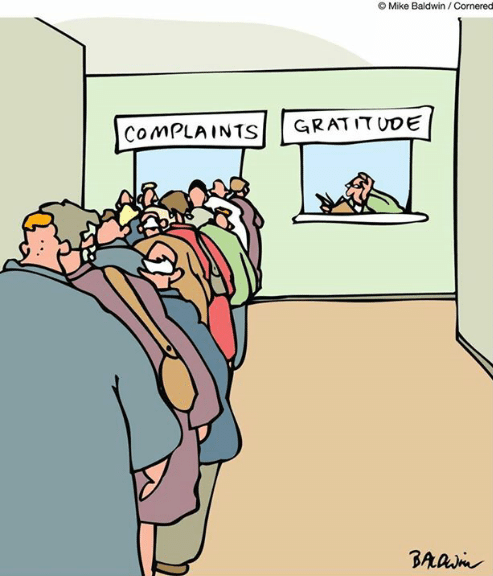
This is the first part of a series looking at Gratitude.
“for they neither glorified God nor gave thanks to him” (Rom 1:21)
“I can’t believe how my boss is treating me. All she gives me is filing and meaningless work all day. Doesn’t she know what I’m capable of? I got top marks in my class at university.” So went the conversation with Jack. All he could see was a dark abyss of despair. His great potential was being wasted at this company. He had only been in the job less than 9 months, yet still he felt like his life was being cut short by a boss who failed to treat him with the respect he deserved.
Rachel was an assistant in the kids ministry. She served faithfully every Sunday even if she got in from a business trip early Sunday morning, she would go straight from the airport to serve. One week, a kid had been particularly naughty and she had informed his parents about his behaviour. Instead of gratitude at this information, the parent tore into her, blaming her for not making the class interesting enough and failing as a teacher. Rachel smiled graciously but inside she was fuming. Didn’t she know how much she had sacrificed to do this? She wasn’t being paid to do it and she certainly wasn’t trained. That evening, she couldn’t sleep, all she could think about was how she would resign from the kids ministry. “No-one appreciates me,” she thought.
Entitlement and rights
We live in a culture that swims in rights. We all feel entitled to be treated a certain way otherwise we sue, complain or demand our rights. One of the most common adjectives used to describe the millennial generation is ‘entitled.’ Researcher Jean Twenge explains that parents in the developed world now have fewer kids, focusing their attention on providing the best for them, telling them not to “worry about chores around the house and focus on your studies.” But this has left a whole generation with a sense that life should revolve around them.
Yet it is not just millennials. Any of us who have grown up with a degree of comfort easily fall into seeing yesterday’s luxuries as today’s necessities. And the thing is: culture expects you to feel entitled. Retailer Marks and Spencer changed their tag line to “Your M&S” as if it was somehow all about my desires and not about making profit for the company.
But Scripture says ingratitude is at the foundation of sin. Paul in Romans 1 when talking about the unrighteous says “For even though they knew God, they neither glorified him as God nor gave thanks to him” (Rom 1:21).
Paul is saying that at the heart of sin is an inability to see everything you have in life as gift. An unmerited gift from a good and gracious God. John 3:16 tells us that “God so loved the world that he gave….his only Son.” James 1:17 proclaims “Every good and perfect gift is from above, coming down from the Father of the heavenly lights.” In other words, the goodness of God overflows with undeserved generosity to us. In Christ. Every single day. In the air we breath. In the food we eat. In the people around us. We are blessed beyond compare.
And so ingratitude is simply an independent, self-reliant spirit. It is claiming a gift as right based on our personal merit. “I deserve it” not “God is gracious” is our mantra. And the moment the gift is withdrawn or hidden temporarily, we fume like Jonah, whose “it’s not fair” complaint at the removal of a shady vine in the heat of summer failed to recognise the vine was a gracious gift in the first place. Why? Because he saw God as only good if he gives me what I want, when I want it because I deserve it. This is fundamentally about self-glory not God-glory.
My hot water stopped working while I was having a shower in winter time. I cursed the building management and thought of how I could express my complaint in the strongest possible language. A few minutes later the heating came on again and my fury abated. But I had never before thanked the building management for providing hot water. I had never thanked God for providing hot water. I had a contract. It stipulated that water would be provided and I expected nothing less. And I was absolutely justified in my complaint. Of course, I would have been irritated at you if you had reminded me that 2 billion people still live without any water at all. I don’t count hot water as a blessing. It’s a necessity. Right?
But, then I realised. Even having my own ingratitude exposed to me is grace. We naturally withdraw from ungrateful people. We feel used by them. For all our effort, they give us nothing back. So we pout, boil, or cold-shoulder. They’re not worth our time. But God is not like that. In all our ingratitude, he doesn’t move away from us, he moves towards us. Not with a pointed finger but with open arms. He comes to rescue us from our entitled prisons to release us into a place of grateful freedom. And it is the exposing of the paucity of our gratitude that reveals day-by-day an ocean of God’s grace towards us that is way deeper than we could ever imagine. And this is the fuel for a lifestyle and a discipline of ever-increasing thankfulness.
So what are you grateful for?
